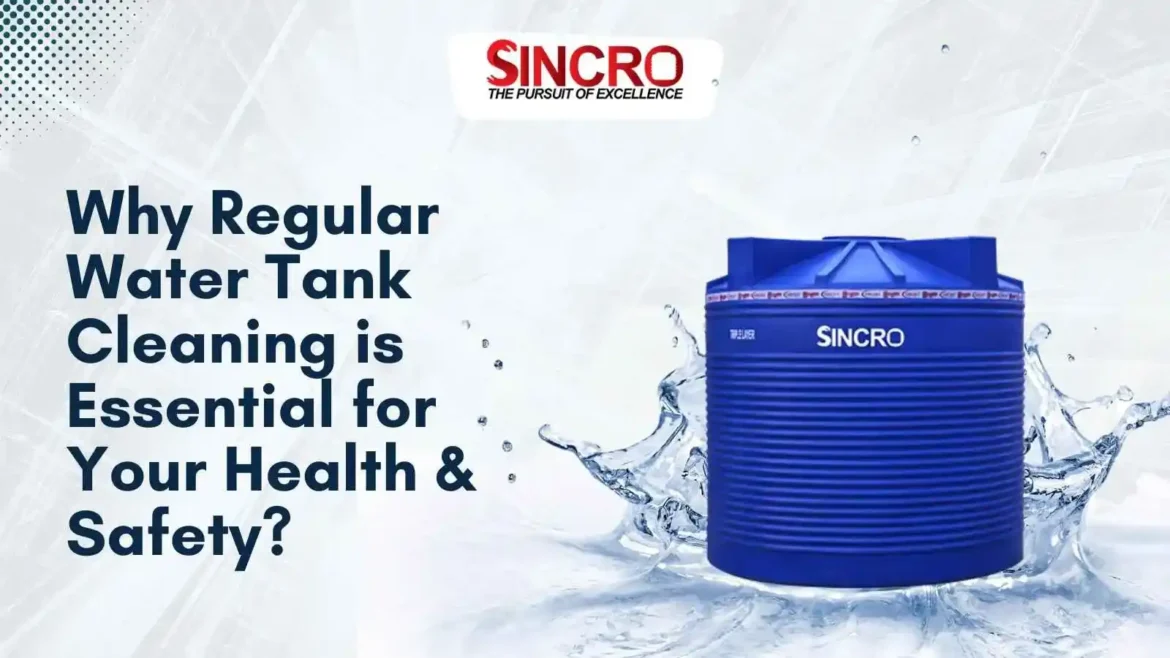Water is an essential part of our life, and its quality directly impacts our health and well-being. Access to clean water is crucial for every household, business, and community. Whether it is for drinking, cooking, cleaning, or irrigation, the water we use must be clean and safe.
However, while most people are conscious of ensuring the water they consume is free from contaminants, they often overlook the importance of regularly cleaning their water tanks. These tanks, if left unmaintained, can become breeding grounds for harmful bacteria, contaminants, and debris.
This blog explores why regular water tank cleaning is essential for your health and safety. It details the risks of neglect, the benefits of frequent maintenance, and expert recommendations on how often cleaning should occur.
1. Preventing Pollutants Growth
Water tanks, especially those stored in outdoor settings or underground, are exposed to various elements, making them susceptible to contamination. Over time, dust, debris, leaves, insects, and other materials can find their way into the tank. Additionally, cracks in the tank’s surface can allow microorganisms to enter.
Standing water creates an ideal environment for bacteria and other harmful pathogens to thrive. Once these bacteria contaminate your water supply, they can pose severe health risks, ranging from gastrointestinal illnesses to respiratory problems. In some cases, prolonged exposure to contaminated water can lead to life-threatening infections.
Regular cleaning ensures that these contaminants are removed before they have a chance to multiply, helping you safeguard the health of everyone who uses the water.
2. Eliminating Algae Deposition
Another reason to clean your water tank regularly is to prevent the buildup of algae and mold. Algae growth is particularly common in tanks exposed to direct sunlight or warm temperatures. When algae form inside the tank, they not only degrade the water’s quality but can also produce toxins that are harmful when consumed or used for washing.
Also Read – Practical Tips to Prevent Algae Growth in Water Storage Tank
Similarly, mold can grow on the interior surfaces of water tanks, especially in tanks with cracks or leaks. Mold exposure, either through drinking contaminated water or using it for bathing, can trigger allergic reactions, respiratory issues, and, in severe cases, infections. Regular cleaning will remove these harmful substances and prevent their reoccurrence.
3. Maintaining Water Quality
Water quality can deteriorate quickly if tanks are not regularly cleaned. Debris, sediment, and rust accumulate at the bottom of the tank, making the water appear murky or foul-smelling.
Even if the contaminants themselves are not immediately harmful, poor water quality can affect daily life, making it unpleasant to drink, cook with, or bathe in.
In addition, sediment buildup can clog pipes and cause corrosion, leading to costly repairs and decreased efficiency in water systems. Regular tank cleaning and flushing help maintain clear, odorless, and fresh-tasting water, ensuring your household enjoys high-quality water.
Also Read – Dangers of Using Outdated or Damaged Plastic Water Tanks
4. Prevent Waterborne Diseases
One of the most significant risks of having an unclean water tank is the possibility of contracting waterborne diseases. Contaminated water is responsible for spreading diseases such as cholera, dysentery, typhoid, and gastroenteritis. These diseases can affect both adults and children, with young children, the elderly, and those with weakened immune systems being particularly vulnerable.
Regular water tank cleaning can drastically reduce the risk of these diseases by preventing harmful pathogens from breeding and contaminating your water supply. This proactive approach is particularly vital in areas where municipal water sources may only sometimes be reliable or where water is stored for extended periods.
5. Enhancing Water System Longevity
Water tank cleaning protects your health and prolongs the lifespan of your water storage system. Dirt and debris accumulated in the tank can cause wear and tear on the tank’s materials. Corrosion, rust, and cracks may eventually form, weakening the tank’s structure and making it prone to leaks and breaks.
A well-maintained water tank is less likely to suffer from such issues, ensuring that your water storage system lasts longer and functions efficiently. Regular cleaning also provides an opportunity to inspect the tank for signs of damage, allowing you to address any minor repairs before they become more significant, expensive problems.
6. How Often Should You Clean Your Water Tank?
The frequency of water tank cleaning depends on several factors, including the size of the tank, the type of water being stored, and the environment in which the tank is located. As a general rule, most water tanks should be cleaned at least once or twice a year.
However, tanks that store non-potable water or are located in areas with heavy contamination may require more frequent cleanings.
It’s also important to note that after any maintenance work on your plumbing system, or if there has been a breach in the water tank (e.g., cracks or leaks), you should thoroughly clean and disinfect the tank immediately to prevent contamination.
Also Read – Factors Determining Durability of Water Tanks
A Small Effort for Long-Term Health and Safety
Regular water tank cleaning may seem like a minor chore, but it is essential for ensuring the health and safety of your household or business.
By removing harmful contaminants, preventing the growth of bacteria and algae, and maintaining the quality of your water, regular cleaning keeps your water supply safe and fresh. Moreover, it extends the life of your water storage system and ensures compliance with health regulations.
Water tank cleaning should be a regular part of your household or facility maintenance routine. Whether you’re using small household tanks or large industrial plastic water storage tanks like Sincro water tanks, ensuring they remain clean and free from contaminants is essential for the health and safety of all who rely on them.
By preventing harmful microorganisms, debris buildup, algae growth, and ensuring compliance with drinking water standards, regular tank cleaning protects your health and prolongs the lifespan of your water tanks. Don’t wait until contamination occurs — schedule regular cleanings to ensure your water remains safe and pure.
Frequently Asked Questions
1. Why is it important to clean your water tank?
Regular water tank cleaning removes biofilm, sediment, and harmful substances that accumulate over time, preventing these issues from escalating.
2. What is the purpose of tank cleaning?
Regular cleaning and maintenance of water tanks help preserve water quality by removing accumulated debris and contaminants, ensuring that the water remains safe for consumption.
3. What is the importance of cleaning water?
Cleaning water is crucial for public health, environmental protection, and economic development. It ensures access to safe drinking water, prevents waterborne diseases, protects ecosystems, and supports agriculture, industry, and tourism.
4. What is the purpose of a water tank?
Water tanks can be used for storing water for many different uses. These uses can range from emergency fire suppression, irrigation, to providing drinking water and taps for washing.
5. What happens if you don’t clean your tank?
When you skip regular cleaning, your water tank can turn into a breeding ground for bacteria, algae, and harmful components. This compromises the safety of your water supply, making it unfit for consumption or daily use. Contaminants like bacteria and viruses thrive in dirty tanks.










